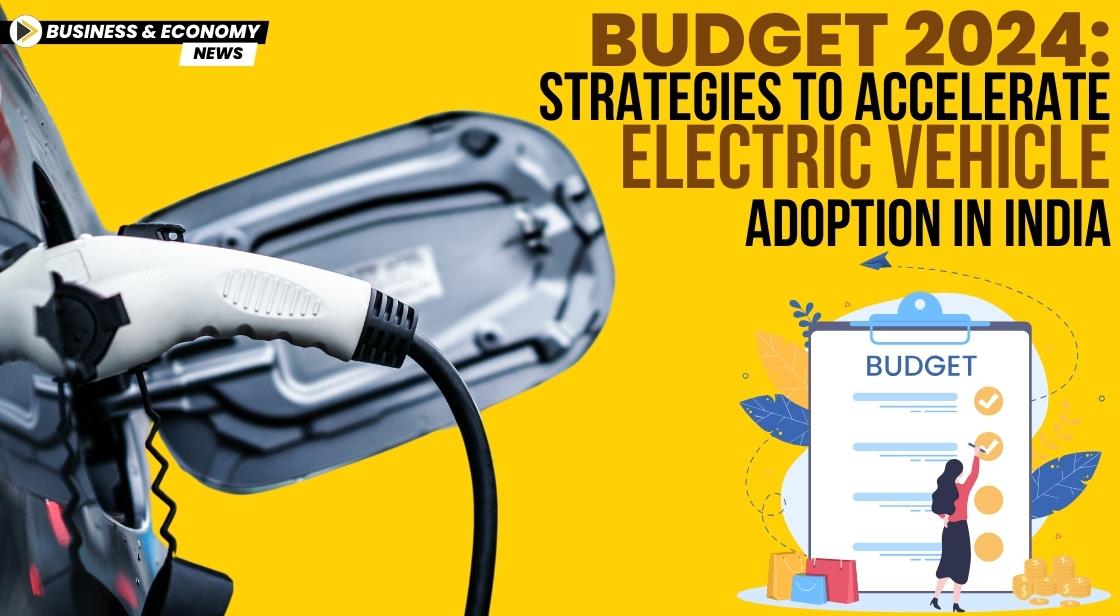Budget 2024: Strategies to Accelerate Electric Vehicle Adoption in India

News Synopsis
The upcoming Budget 2024 has stirred considerable excitement across multiple industries, especially within the electric vehicle (EV) sector. As the government prepares to unveil new policies and financial strategies, many experts are hopeful that this budget will introduce significant measures to facilitate the broader adoption of EVs in India.
Numerous industry leaders have outlined their expectations and recommendations on how the government can motivate more individuals to transition to electric vehicles.
Industry Leaders' Expectations for Budget 2024
Prashant Vashistha, CMD of Sokudo Electric India
Prashant Vashistha, Chairman and Managing Director of Sokudo Electric India, is hopeful that Budget 2024 will include targeted incentives to make EVs more affordable for daily commuters. As a manufacturer of electric two-wheelers, he emphasizes the importance of measures like the FAME 3.0 scheme.
"I look forward to targeted incentives like FAME 3.0 that could make electric two-wheelers more affordable for everyday commuters, enabling us to increase our market presence," Vashistha states.
He also suggests reducing GST on EVs and offering higher purchase subsidies to boost consumer adoption. Additionally, Vashistha highlights the need for supporting local battery production and innovation to enhance the overall EV ecosystem.
Akihiro Ueda, CEO of Terra Charge
Akihiro Ueda, CEO of Terra Charge, shares similar views. As a provider of charging infrastructure solutions, he is keen on policies that support the expansion of EV charging services.
"With an anticipated outlay of Rs 10,000 crore in the budget, FAME 3 could provide necessary support to EV producers and consumers," Ueda notes.
He anticipates specific provisions such as subsidies and tax incentives for the charging infrastructure sector, which could alleviate range anxiety and encourage more people to purchase EVs. Ueda also emphasizes the need for increased funding for research and development in battery technology and grid integration to bolster the expansion of the charging sector.
Nehal Gupta, Founder and MD of AMU Leasing
Nehal Gupta, Founder and Managing Director of AMU Leasing, also looks forward to the FAME 3.0 scheme. She believes that the anticipated Rs 10,000 crore outlay in Union Budget 2024 could significantly boost EV sales and incentivize non-banking financial companies (NBFCs) to offer financing to both fleet and retail buyers.
"As a cleantech financing player, I look forward to an improved investment structure, reduced interest burden for EV entrepreneurs and buyers, especially women borrowers, and a dedicated share of funds for NBFCs offering cleantech financing," Gupta remarks.
Gupta also expects the budget to include provisions for vehicles powered by hydrogen and biofuels, which could pave the way for India’s cleantech space.
Promoting EV Adoption through Government Measures
The FAME (Faster Adoption and Manufacturing of Hybrid and Electric Vehicles) scheme has been pivotal in promoting EV adoption in India. With the anticipation of FAME 3.0, experts believe that the government could introduce several measures to make EVs more affordable and accessible:
-
Reducing GST on EVs: Lowering the Goods and Services Tax (GST) on EVs can significantly reduce their cost, making them more appealing to consumers.
-
Increasing Purchase Subsidies: Higher subsidies can help offset the initial cost of purchasing EVs, encouraging more people to switch from conventional vehicles.
-
Supporting Local Manufacturing: Incentives for local battery production and innovation can help build a robust domestic EV ecosystem, reducing dependency on imports and enhancing sustainability.
Importance of Charging Infrastructure
The development of charging infrastructure is critical to the success of EV adoption. Government support in expanding charging stations across the country can help reduce range anxiety, making EVs a more viable option for consumers. Subsidies and tax benefits for the charging infrastructure sector, along with increased funding for research and development, can play a significant role in this regard.
Financing for EV Adoption
Financing plays a vital role in promoting the adoption of EVs. Supportive measures for cleantech NBFCs can empower modern financing firms to customize their offerings to meet the evolving demands of India’s cleantech sector. This involves enhancing investment structures, lowering interest burdens for EV entrepreneurs and buyers, and allocating dedicated funds for NBFCs that provide cleantech financing.
Conclusion
The forthcoming Budget 2024 offers a crucial opportunity for the government to enhance the adoption of EVs in India. Implementing targeted incentives, lowering GST, increasing subsidies, and backing local manufacturing and charging infrastructure can help establish a more sustainable and accessible EV ecosystem.
You May Like









